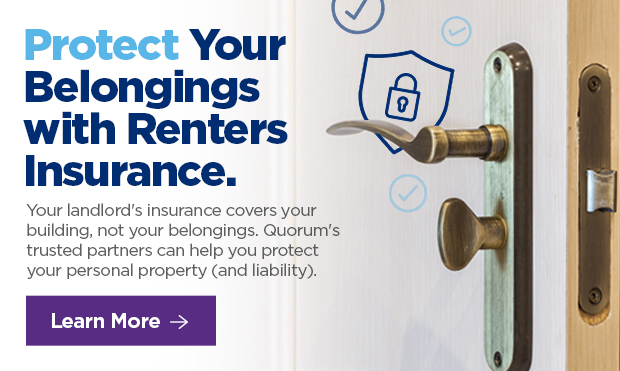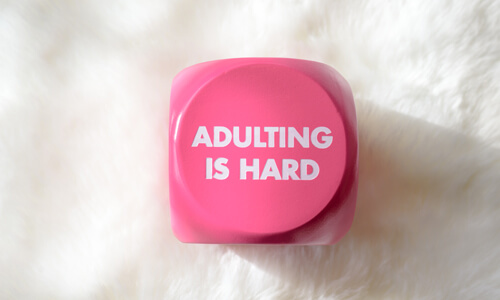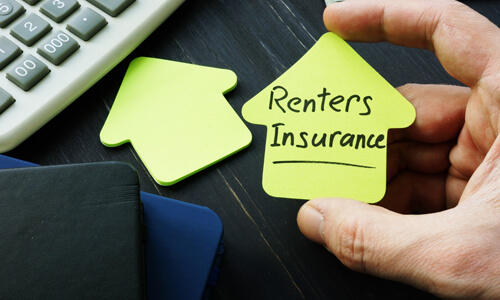You’ve saved enough cash to move out of your parents’ house, and are a few short steps from signing your lease on your new apartment. Congratulations; you are beginning your life as a fully independent adult!
This is the perfect time to remind you that your money management job isn’t done. On the contrary, it’s just beginning! A crucial part of establishing financial security will be adopting and maintaining smart money habits (like creating a budget, monitoring your credit report and paying yourself first). And you’ll want to apply some financial tips right away specifically to protect you and your new apartment.
1. Check for pre-existing damage.
Most landlords require a security deposit in the amount of one month’s rent. This protects the landlord in case you damage the unit during your rental term. But you want to protect yourself from having to forfeit that deposit in the future due to a prior tenant’s mess. So, conduct a thorough walk-through of the space before bringing in your stuff to note any pre-existing damage, such as the following:
- Dings or dents in the wall
- Stains or holes in the flooring
- Gouges or problems with the kitchen and bath countertops or cabinets
- Scratches or issues with appliances or plumbing fixtures
- Cracks or damage to the windows and doors
Some landlords initiate this inspection, potentially even joining you on the walkthrough to note such damage in written or photographic form, or both. If they don’t, complete this review yourself, photographing any damage and sending an email to the landlord that details everything you found backed up by your photos. Maintain a copy of this documentation until you move out.
2. Create a home inventory.
Whether you’re a first-time homeowner or renter, one of the smartest habits you can adopt is creating a home inventory when you move into a new place. This inventory is basically a list of everything you own with details like the color, make, model and quantity of items, along with serial numbers for big-ticket things like appliances and electronics.
With a home inventory, you’re prepared to prove what you own in the event your dwelling is burglarized, burned or harmed in some other way. Critically, you won’t have to rely on your memory in a stressful situation to fill out a police report or an insurance claim on your renters policy.
3. Buy a fire-proof safe.
Once out on your own, you also need to take special care of documents that contain your personal identifiable information. This includes documents like:
- Birth certificate
- Social security card
- Passport
- Any physical copies of important financial documents like a will, your lease, account statements or an auto insurance policy
Keeping such documents in a locked, fire-proof safe will help protect you from identity theft. It will also preserve them in case of fire or water damage in your apartment.
4. Update your mailing address.
Speaking of financial documents, even paperless statement recipients need to notify their financial institutions of their new mailing address. This includes any with which you have the following types of relationship:
- Checking, savings or term account
- Credit card
- Student loan
- Personal loan
- Car loan
- 401(k)
- Traditional or Roth IRA
- Brokerage account or mutual fund
It’s easy to update your address through online or mobile banking. Your contact information is typically located in the profile link, where you’ll find an edit option. Taking this step is another good way to protect your identity and ensure that your financial institution doesn’t send statements or other information to an address where you no longer live.
5. Invest in renters insurance.
Think about all the valuable things that you’re taking with you to your new place. Your laptop and smartphone. Your television and possibly a gaming console. Your first professional wardrobe. All of these items would cost a lot of money to replace if stolen or to repair if damaged. That’s why an affordable renters insurance policy is a good investment.
After your deductible and within your designated limits, these policies cover the replacement or repair costs of stolen or damaged personal belongings located in your apartment, a storage facility or with you when you’re not at home. By the same token, a renters policy also gives you liability coverage if someone is hurt while at your place, and it will take care of that person’s medical bills.
6. Take your time decorating your new place.
Last but not least, don’t be in a rush to buy all new furniture or go all out decorating your new place. For starters, it takes time to develop your own personal style. Moreover, there’s no point in spending a lot of money on something trendy that will be outdated before your lease is up or on making improvements to a space you don’t own. For example, painting walls isn’t always allowed, so you’d be responsible for restoring the original color when you move out or else you’d forfeit all or part of your security deposit.
Still, that doesn’t mean you can’t have a stylish apartment. There are lots of ways to furnish your first place for less. You’ll be amazed at the amount of decent furniture and other cool stuff you can find at garage sales and thrift stores or in your parents’ attic. As ever, one person’s trash is another’s treasure.
Enjoy your new place!






Comments Section
Please note: Comments are not monitored for member servicing inquiries and will not be published. If you have a question or comment about a Quorum product or account, please visit quorumfcu.org to submit a query with our Member Service Team. Thank you.